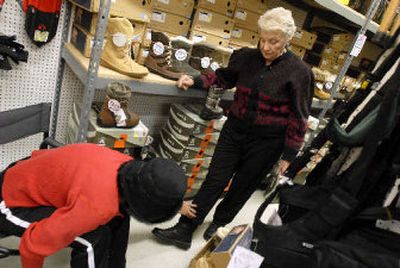She’s a perfect fit

Lois Huber fits loggers and linemen with work boots, and recommends raingear for construction crews.
The 74-year-old is a top seller at the Army-Navy Store in Coeur d’Alene, combining a “mother knows best” attitude with a formidable knowledge of outdoor gear.
The store caters to a largely blue-collar clientele – guys whose work doesn’t stop just because it’s raining or snowing. They trust Huber for straight talk about Gortex and nylon jackets, boots and long underwear.
“She tells it how it is,” said Richard Watson, a sales associate at Army-Navy. “She lets them know straight up if the product’s going to work. She doesn’t push to get the sale.”
Fit and function are essential for Army-Navy’s clients.
“First you ask what their job is,” Huber explained. “Some guys need a flat sole if they’re concrete pourers; others need a lug sole if they’re in the woods. Guys have to have boots, that’s all there is to it, and they have to have clothes to work outside.”
Huber can peg boot sizes with a glance – “You look like a size 9 ½,” she’ll tell a customer – and her assessing gaze doubles as a tape measure for fitting coats, vests and thermal underwear. She wants customers to try on clothing, though, and to walk, stretch, reach and bend before buying it.
“Most of the things we carry are tried and true,” Huber said. “That raingear – you get it out on a mill yard, and every guy wants one.”
Huber credits her interest in outdoor gear to the practical experience of raising six kids in North Idaho’s four-season climate. She also has an extensive retail background. Huber sold appliances and worked at the now-closed Tom’s Sportco in Coeur d’Alene before coming to Army-Navy eight years ago. At her former job, she was a top seller of Sorel boots in the western United States
“She loves to sell and she knows the products,” said Philip Motl, the former manager of Army-Navy, who purchased the store last year. “I begged my old boss to hire her. Business has flourished ever since she came.”
Rusty Higbee, a sawmill supervisor, stopped by Army-Navy on Tuesday after work, looking for a stocking cap that he could wear with a hardhat.
“I recognize her,” he said of Huber. “My whole family buys boots here.”
Customers like Higbee account for the majority of Army-Navy’s sales, Motl said. The store’s niche is practical, affordable gear for people in trades.
“Not everybody’s got a $100 bill to drop on a pair of hunting pants,” Motl said. “We’re one of the few grunt stores left.”
The store also carries a large selection of women’s wear, including 45 styles of women’s boots. Barbara Baker stopped by the store on Tuesday. The recent California transplant was updating her wardrobe for snow and sub-freezing temperatures.
“This is my first experience shoveling a driveway,” said Baker, who moved to Post Falls last spring. She gave Huber a grateful kiss on the check before leaving the store with Kamik boots, wool socks and a set of merino wool underwear.
Last week, Huber sold $464 worth of socks to a woman from Nine Mile Falls, Wash. The customer was buying socks for her five grown sons.
Huber, the store manager, works together with Motl on ordering. They’re both advocates of merino wool socks, undershirts and long underwear.
“Merino’s the cat’s meow,” Motl said. “It feels like silk and it’s totally functional. It’s anti-odor and anti-bacterial…You could almost wear the same pair all winter.”
Huber sells a pair of merino wool socks with nearly pair of boots that goes out the door.
“Don’t wear cotton socks,” is a frequent piece of advice she gives to clients. Cotton traps moisture, leading to soaked boot linings and ice-cold feet, Huber said. A $10 to $15 per pair, the socks are a bit pricey, but a good investment, she said.
“Don’t wash that with cotton,” is the second piece of advice that customers hear. Cotton leaves bits of lint on merino wool, which hinders the wool’s performance, Huber said. “It balls up and gets stiff and cooked.”
Huber works a standard 40 hour week. Last year, she took only one week of vacation.
“She’s going to retire when she’s 80,” Motl said, “and I’m just about going to have to close the door.”